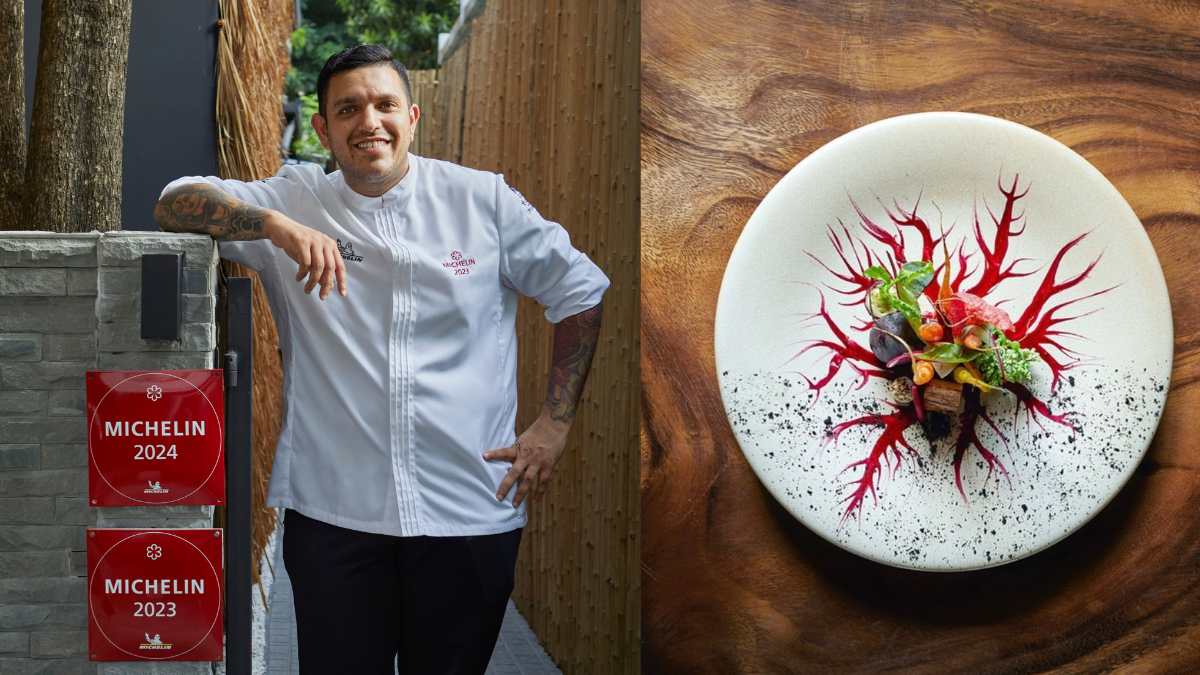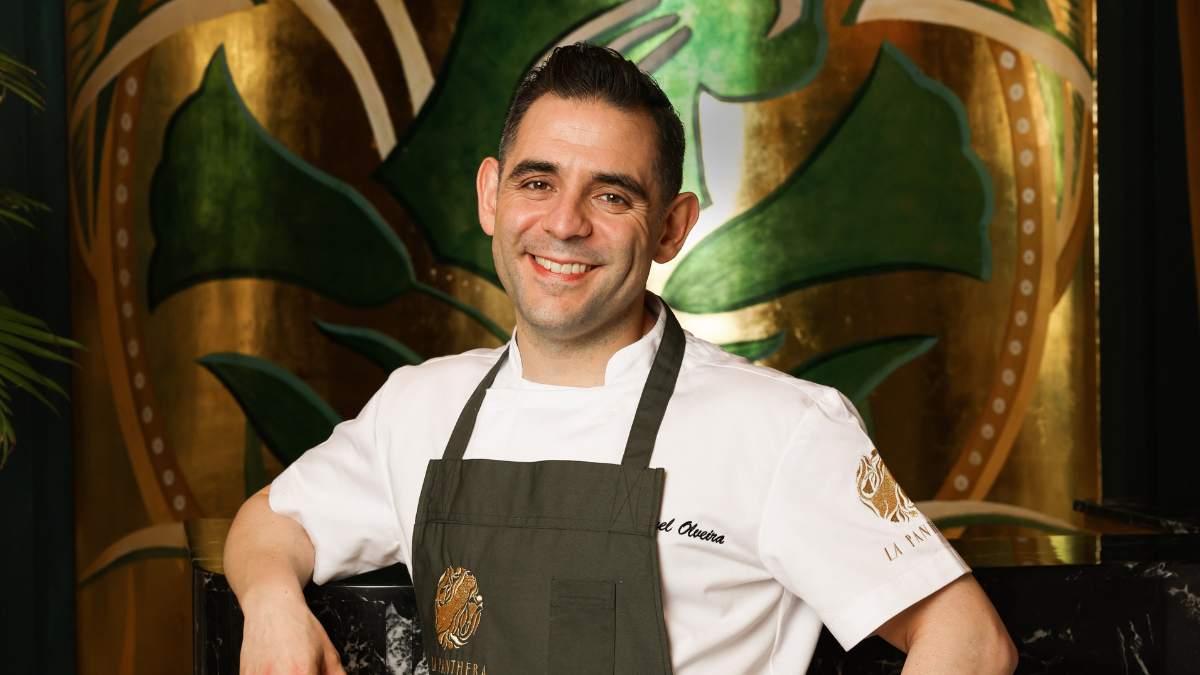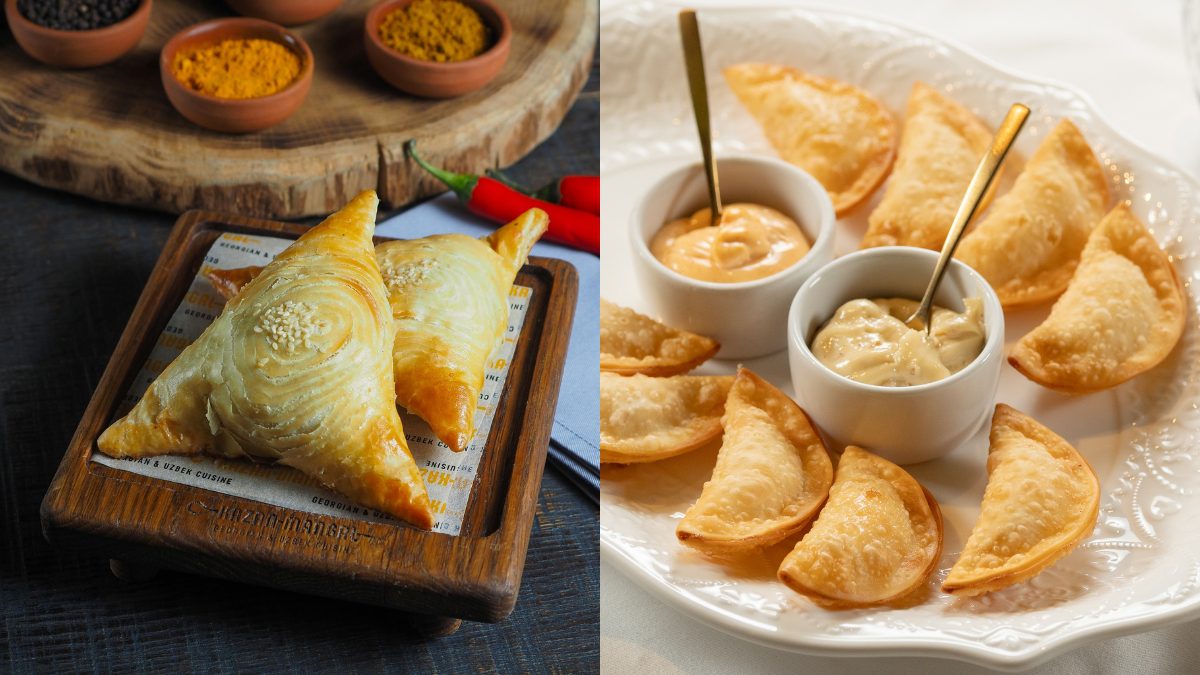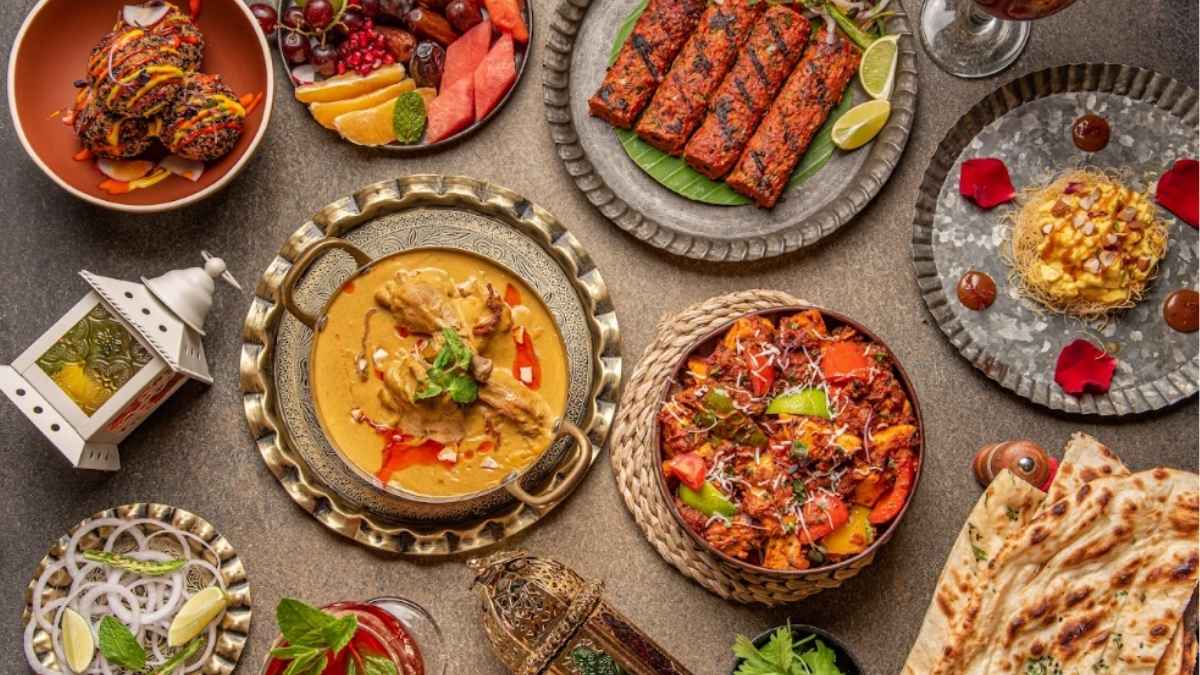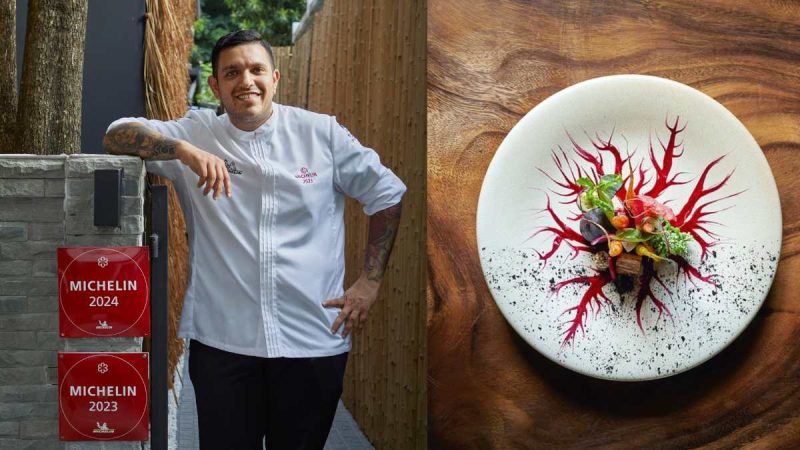At Bangkok’s Michelin-starred restaurant Haoma, onion peels never make it to the bin — instead, they arrive at your table as crisp onion bread cradling a chilled, minty crémeux, a clever nod to the Bombay Sandwich. There’s no plastic in sight. The chilled and sparkling water on your table is a simple by-product of rainwater harvesting. Helmed by Indian chef-owner Deepanker Khosla, Haoma is Thailand’s first zero-waste restaurant and the recipient of both a Michelin Star and a Michelin Green Star.
Haoma, Bangkok’s Michelin-Starred Restaurant Arrives In Bengaluru
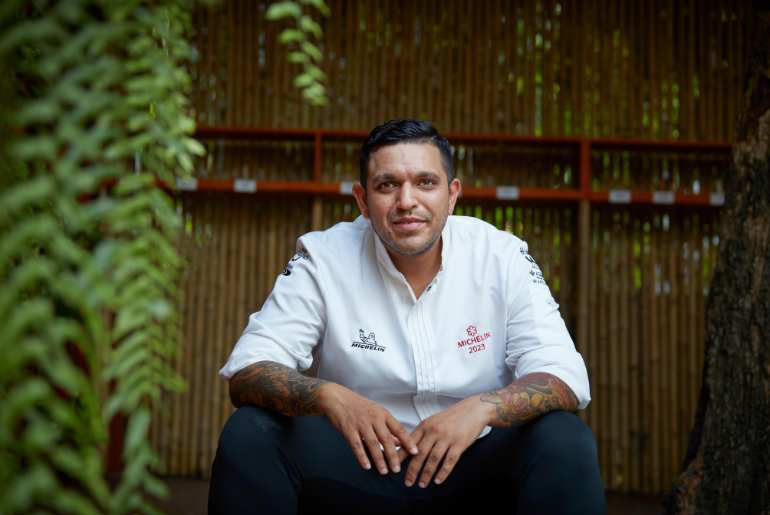
In the urban jungle of Bangkok’s Phrom Phong, nests Haoma, a green oasis where the finest Neo-Indian cuisine is served in a farm-to-table setting. Sustainability is the heart and soul of Haoma, a name inspired by a plant believed by Zoroastrians to bless one with health and immortality. An ode to the symbiotic relationship between the diner and the resources blessed by nature.
The desire to celebrate India’s millennia-old culinary legacy while upholding a strong waste-positive philosophy was the birth of Haoma, chef Deepanker Khosla’s mission statement that fine dining can (and should be) ethical.
In 2023, Khosla became the youngest Indian to ever receive a Michelin Star, and Haoma, the world’s only Indian restaurant to have a Green Star.
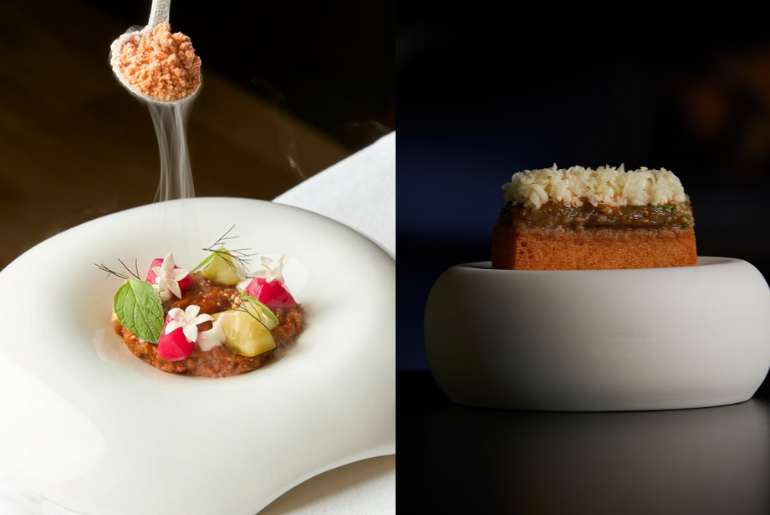
Making its India debut, the award-winning 8-year-old Bangkok restaurant arrived at Zarf, Sheraton Grand Bengaluru Whitefield Hotel & Convention Center, for a special pop-up. Over 7 beautifully plated courses of a Litti Chokha-inspired amuse bouche, spicy Tomato Chaat soothed with tomato sorbet, a heritage Nihari main, and the star of the show, Textures of Chocolate (made with cocoa beans and pod), Chef Deepaker Khosla showcased familiar Indian flavours in an elevated yet ethical setting, with his insightful storytelling leading the way.
Following an exemplary Michelin-starred meal, we got talking to the man of the hour, Deepanker Khosla.
Chef Deepanker Khosla Talks To Curly Tales
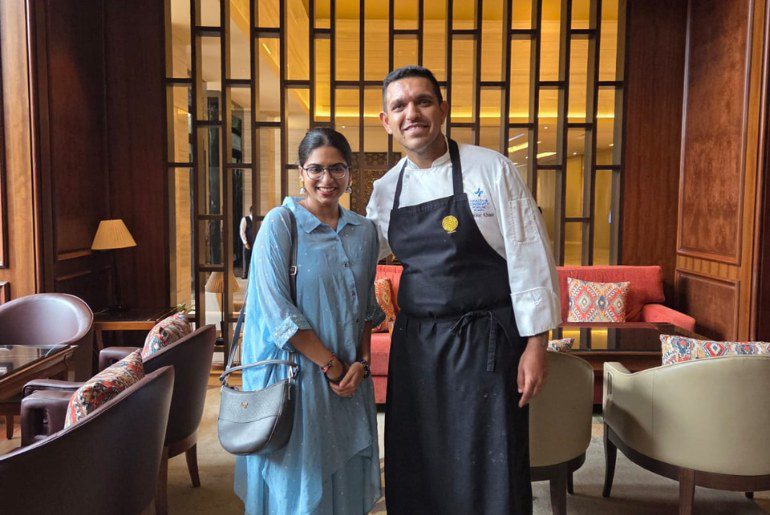
1. The foundation of Haoma rests on your “Grow and Give Back” philosophy. Talk us through this philosophy.
10 years ago, when I implemented the ‘Grow and Give Back’ philosophy, it was like walking through a long, dark tunnel with a torch in hand with flickering batteries. Even today, there’s no handbook for this.
As chefs, we take a lot from the environment to put food on the plate. I am a very strong believer in karma. I need to give back to keep my karmic cycles in check.
And at Haoma, I have merged spirituality with creativity.
To go back a little, I will tell you why Bangkok. Firstly, it was in my destiny. Secondly, in 2016, Bangkok was the most polluted per capita city in the world. But that didn’t deter me. I decided to take the bull by the horns and opened my own farm just 17 km from the restaurant.
To some, it looked like prime real estate—perfect for 50 towers. To me, it was the perfect land to rear 750 chickens and grow my own herbs and garnishes.
View this post on Instagram
I love the term ‘waste positive’ because ‘zero waste’ is impossible, and it’s a loosely used term. To achieve our ‘waste positive goals’, we try to identify the root cause of a problem and then create a solution to tackle it.
To eliminate single-use plastic bags, we created jholas out of old tablecloths (an idea I borrowed from my grandmother). When we needed to wash those jholas, we realised soap is carcinogenic. So, we repurposed excess oil from our fryers to make soaps (to wash linen).
We tackled problem after problem to arrive at a position where we got awarded the most Sustainable Restaurant Award 2024 by Asia’s 50 Best Restaurants.
2. Did you ever imagine you’d win a Michelin Star and a Green Star? What’s the secret ingredient towards getting one?
I think nobody has cracked the code. If we had cracked the code, then we’d open a restaurant with a Michelin Star—and I wouldn’t have had to wait five years to get it.
I ran the restaurant for four years before they(Michelin inspectors) even walked through my doors. I think they are awarding the craft. You have to hone your craft until you arrive at that level where you’re globally recognised.
Do we cook for it? Maybe not.
View this post on Instagram
But are we rewarded for our hard work, our relentlessness, our 16-hour days, staying away from our families and friends, not going home for Diwali and Holi, staying there on the pass and cooking every day?
I guess the answer is yes.
Also Read: CT Exclusive: Chef Chalee Kader Of Bangkok’s Michelin-Starred Wana Yook Talks To Us
3. Chef Gordon Ramsay played a special role in your culinary journey. Do share this story. If you could feed him a signature dish, what would that be?
I was all of 17 when broadband internet came into existence—and so did Pirate Bay. I downloaded Gordon Ramsay’s shows, Boiling Point and Hell’s Kitchen.
That was the turning point of my life, where I went, “Whoa! This is the epitome of macho man. This is what I want to be.”
That’s where I fell in love with his ideologies. Gordon is a great and successful chef. His TV personality, versus when I actually met him, is two completely different people.
Television, as we know, demands a certain side of you. I’ve been on Iron Chef, where I was supposed to wear a bandana and do “Hoye!” (points an imaginary knife at me with a steely gaze).
While I haven’t yet had the privilege of hosting him at Haoma, I know Gordon Ramsay recently opened a restaurant in Bangkok. So, I’m sure that day isn’t far.
I would feed him my Nihari, and I’m sure if he could feed me one thing, it would be his Wellington.
4. Rainwater harvesting helps you achieve your sustainability goals at Haoma. But does it impact the taste of the food as well?
I personally believe there’s no place for bottled water from Swiss lakes or Italy at my restaurant in Bangkok. Just because certain brands aggressively market themselves and pressure restaurants through celebrated lists doesn’t mean I should be using them.
Imagine—my water travelling 9,000 km just to be at my restaurant! That’s f***ing insane, right?
It’s the most alien thing I could do to the world’s estuaries.
Bangkok gets over 180 mm of rainfall in September alone. When I was building the restaurant, I went back to a very simple idea: rainwater harvesting—just like we did in India.
We became the world’s first restaurant to have an aquaponics farm (integrated farming and fish technology) on-site. Haoma also has an advanced filtered water system, Nordaq, which turns rainwater into still and sparkling water—served directly to our guests.
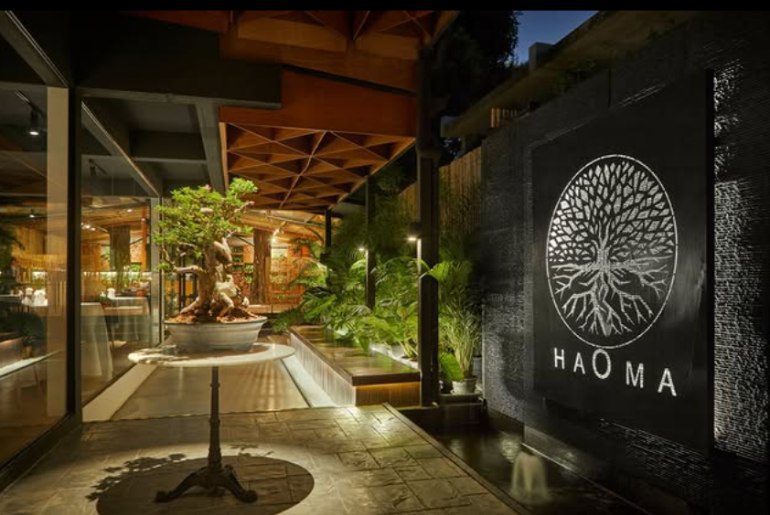
And how this impacts the food is interesting! The dal in India versus the dal in Thailand—though cooked with the same ingredients—tastes different because of the minerality of the water.
So, at Haoma, we adapt to the minerality of the water available around us. We don’t say, “Bisleri India se mangalo, dal banane keliye.” (Get Bisleri water from India to make dal.)
Some chefs actually do that—which is insane to me!
I believe food tastes better when you use local water. At the very least, it tastes better to the soil.
Also Read: From Raj Kachori To Chicken Sukka, 5 Indian Dishes That Wowed Judges On MasterChef Australia 2025
Rapid Fire With Chef Deepanker Khosla
1. A must-try dish at Haoma
Nihari
2. Your favourite comfort food
Dal-Chawal and Aloo Gobi
3. A dish you ate to celebrate your Michelin Star
Eggplant and Pork Mince from Yu Ting Yuan (Michelin-starred Cantonese restaurant at Four Seasons Hotel Bangkok)
These dishes are to die for!
So, the day you got your Michelin star, did you dine here?
The day I received my Michelin Star, I slept in my parking lot cause I drank so much.
My wife woke me up in the morning, only to see my face covered in red mosquito bites.
(At this point, we crack up at the visual!)
4. A dish you find overrated
Anything with truffles and foie gras.
Truffle oil is nothing but chemicals. It’s like the American maple syrup with nothing maple in it.
5. A dish you find underrated
Dal-Chawal
6. An ingredient you cannot do without
Garlic
7. A travel destination you want to visit for its food
Japan (over and over again)
8. A game-changing initiative at Haoma that propelled its sustainability goals
Rainwater turned into portable water
9. A tip we can incorporate in our kitchens to repurpose food waste
Grow your own food. Kitchen waste left in your balcony for a week turns into beautiful compost. That’s the soul for your plants.
10. One-line advice for aspiring chefs and restaurateurs
Focus on cooking, stay in your kitchen, and delete your social media (handles) till you are the best at what you have been doing.
Cover Image Courtesy: Supplied
For more such snackable content, interesting discoveries and the latest updates on food, travel and experiences in your city, download the Curly Tales App. Download HERE. First Published: September 23, 2025 4:55 PM
